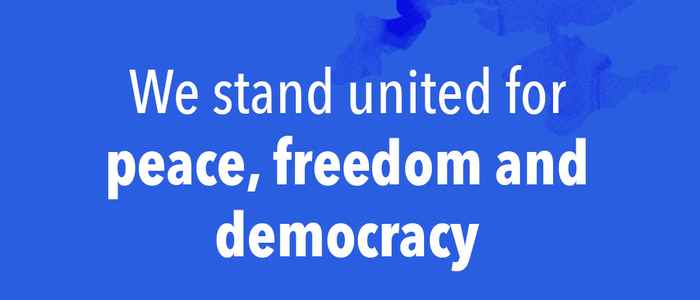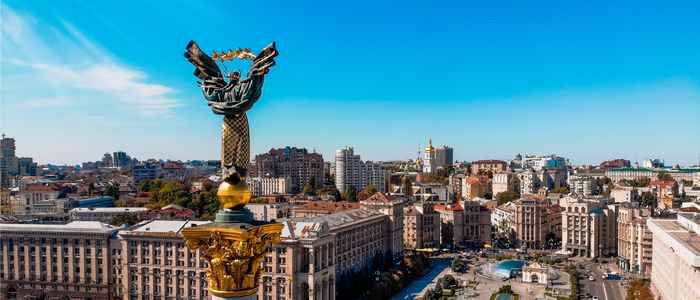Using a compact format of weekly one-hour seminars (a mix of online and on-site events), the series brought together academic experts of Ukraine from across Europe and the Netherlands. Short lectures (30-35 mins) were followed by Q&A sessions.

Lecture series on Ukraine’s history, culture, society and politics
Using a compact format of weekly one-hour seminars (a mix of online and on-site events), the series brought together academic experts of Ukraine from across Europe and the Netherlands. Short lectures (30-35 mins) were followed by Q&A sessions.
What has happened in Ukraine since the 2013-14 Maidan protests, resulting on the flight of president Yanukovich, the Russian annexation of Crimea and the start of the separatist war in the Donbas?
Speaker: Donnacha Ó Beacháin | Date: 15 March 2022
How could we analytically grasp the regional diversity of Ukraine? Why Ukraine`s post-Soviet political, religious, and language pluralism was so often described as a "danger"? What are the historical preconditions and contexts for the ongoing debates, and how could they help us to understand present-day Ukraine`s diversity?
Speaker: Andrii Portnov | Date: 22 March 2022
Roughly once a decade, Ukraine reminds the world of its existence and of the tremendous resilience of its people: the Orange Revolution in 2004, the Revolution of Dignity in 2014, the resistance to Russian invasion in 2022. In this lecture, Dr Olga Buyuk will talk about the nature of and the incremental changes in Ukraine’s civil society that lie behind these and are perhaps less visible and less known to an outside observer.
Speaker: Dr Olga Buyuk | Date: 29 March 2022
Among other things, Putin uses the common affiliation of Russians and Ukrainians to the Orthodox faith to motivate Russian claims on Ukraine. And the Patriarchate in Moscow backs up Putin’s war. The religious landscape of Ukraine is however much more complex than that. Professor Kemper will show how divided Ukraine’s Orthodoxy is, particularly after the recognition of autocephaly of the Ukrainian Orthodox Church by the patriarch of Constantinople in 2019. He will also explain how religious policies differ in Russia and Ukraine and what that means for other religious groups.
Speaker: Micha Kemper | Date: 5 April 2022
The lecture draws on research results from field work in Kyiv in October 2021. Dr Meissner’s lecture sheds light on three decades of economic development, post-Socialist structural deficits, and the results of recent reform measures. It also deals with the impact of the war and dares a look into the future. Indeed, the 2014 Euromaidan Revolution led to a critical juncture. After the immediate shock of the annexation of Crimea and the war in Eastern Ukraine, the country returned to growth from 2016. However, the struggle between reform forces and the old elite – who still exercised control over the judiciary - negatively affected the potential for development. The war now changes the constellation completely.
Speaker: Hannes Meissner | 12 April 2022
State-building had been one of the most important goals of Ukrainian nation-builders / nationalists throughout the 20th century. Yet even the most crucial attempts failed, first at the end of World War I in 1918, and also at the beginning of Germany’s war on the Soviet Union in 1941. When eventually a Ukrainian state was established in 1991, a long history of toiling seemed to come to a successful end. Since 2014, and more so since 2022, this success has become, however, again questioned.
Speaker: Guido Hausmann | 26 April 2022
In Ukraine, a large majority of the populations considers Ukrainian its native language, whereas a significant minority speaks Russian. Over the last decade, this linguistic situation has in increasingly be politicised and served Vladimir Putin as a pretext for the annexation of first Crimea and now the Donbas, allegedly to ‘protect’ the rights of their inhabitants against ‘ethnic cleansing’. On the basis of recent research, this lecture will explain the historical roots and the changing dynamics of bi-lingualism and disentangle the complex links between language and identity in Ukraine. Against this backdrop, the lecture discusses the legal foundations and practical implementation of language policies in the country.
Speaker: Dr Christian Noack | 3 May 2022
During World War II, the lands comprising Ukraine today underwent waves of unprecedented violence: deportations and killings produced by Soviet annexations from Poland and Romania, then death and trauma from German and Romanian regimes that were engaged in the Holocaust, deportation, and anti-partisan warfare. The invaders from the west were driven by the view that not just Jews, but virtually the entire native population, sooner or later, would have to be removed from this “East”. The impact of the war years has been felt in Ukraine ever since.
Speaker: Dr Karel Berkhoff | 10 May 2022
During World War II, the lands comprising Ukraine today underwent waves of unprecedented violence: deportations and killings produced by Soviet annexations from Poland and Romania, then death and trauma from German and Romanian regimes that were engaged in the Holocaust, deportation, and anti-partisan warfare. The invaders from the west were driven by the view that not just Jews, but virtually the entire native population, sooner or later, would have to be removed from this “East”. The impact of the war years has been felt in Ukraine ever since.
Speaker: Dr Uilleam Blacker | Date: 17 May 2022
Referring to Ukraine as an artificial state created by the Bolsheviks, accusing the West of supporting Ukrainian fascism and insisting that Russians and Ukrainians are one single people, Vladimir Putin used false historical narratives to legitimize Russia’s invasion of Ukraine. While having a historical debate with an aggressor and his propagandists would be wrong, we can and should analyse memory politics as one of the dimensions of the Ukrainian-Russian conflict in a broader European context.
Speaker: Dr Tatiana Zhurzhenko | Date: 24 May 2022
This lecture reviews this critical period in the aftermath of the collapse of the Soviet Union and contrasts it with Russia’s annexation of Crimea which was not preceded by pro-Russian mobilization from below. This lecture also retraces the Crimean Tatar claims to the region which run counter to the official Russian historical narrative of “Krym nash” (Crimea is ours).
Speaker: Dr Gwendolyn Sasse | Date: 31 May 2022


